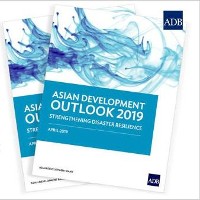28 June 2019
10:00 Raiffa Room, IIASA, Laxenburg, Austria
Central European launch of ADB's Asian Development Outlook Report 2019 at IIASA: Strengthening Disaster Resilience
ADB's ADO this year had as its theme “Strengthening disaster resilience.” IIASA contributed a number of background papers to inform key messages of ADB’s annual flagship report.
Some of these built on work with the Flood Resilience Alliance, a partnership of research, NGO and private sector institutions to build and promote flood resilience at scale.
Key ADO messages building on IIASA contributions were:
- Spending on risk prevention needs to catch up with spending on disaster response, for which a multiple dividend narrative and appropriate evidence is sorely needed. Globally, governments in developing countries receive seven times more assistance for responding to disasters after they occur than for preparing in advance. In Asia, this spending gap has narrowed slightly over the past few years but remains large. Further closing the gap will yield multiple dividends, especially when investments have systems-wide development benefits aside from reducing disaster risk. Examples presented include water resource management that integrates flood risk considerations, the construction of cyclone-safe multipurpose evacuation centers that serve daily as classrooms or community centers and the reestablishment of sustainable mangrove forests to absorb storm impacts and prevent coastal erosion.
- Community-level action is to complement national efforts. Communities are themselves the first to tackle risks and respond to disasters, often with little or no immediate external support. Too little is known how communities reduce risk and resilience. New evidence from flood resilience surveys across 88 communities in Asia using the innovative and systems-based Flood Resilience for Communities (FRMC) measurement tool shows that community-level investments and engagement build resilience while delivering broader development benefits, such as better integrated livelihood strategies in line with disaster preparedness and waste management education, transportation, and food supply.
- Multi-scale humanitarian response is a prelude to recovery and reconstruction. Sustainable recovery needs to overcome operational challenges and bridge the gap between urgent humanitarian response and longer-term recovery and reconstruction. The efficient and equitable allocation of private and public resources in response to disasters is often challenged by deficiencies in governance and local implementation challenges. Case studies analysis of the 2015 earthquake in Nepal and Cyclone Pam in Vanuatu the same year indicate that successful long-term recovery requires broad collaboration involving central and local governments, civil society, and affected communities. The roles and responsibilities of all stakeholders must be clear, and responsible parties must have the experiential knowledge and capacity necessary to absorb and effectively apply the large influxes of resources that materialize after disasters.
During the launch organized on the occasion of the ADO’s Central European launch, ADO lead expert, Benno Ferrarini, will present the report’s main findings on the state of resilience and development across Asia, followed by presentations from IIASA researchers that contributed working papers to the report. Reinhard Mechler and Stefan Hochrainer-Stigler will present key insights from their ADO working paper on the multiple dividends of investments in disaster resilience, including new insights on gauging and communicating these. Finn Laurien and Adriana Keating will add to the discussions with new evidence from measuring community flood resilience in Asia, drawing on IIASA’s work in the Zurich Flood Resilience Alliance. Junko Mochizuki will discuss her joint research with John Handmer regarding factors enabling swift return to normality following disasters. Reinhard Mechler, Deputy Director of IIASA’s Risk and Resilience Program, will moderate the lecture and the subsequent discussion of the report’s key findings and implications.
Report: ADO 2019: Strengthening Disaster Resilience
The Asian Development Outlook is the Asian Development Bank’s annual regional analysis of economic and development issues in developing countries in Asia. In addition to forecasting the inflation and gross domestic product growth rates of countries throughout the region, the 2019 ADO identifies disaster risk from natural hazards as a growing threat to development and prosperity in Asia, stressing the need to strengthen disaster resilience.
Program
- Welcome Remarks
Albert van Jaarsveld | Director General and Chief Executive Officer, IIASA
Benno Ferrarini | ADO lead, ADB - ADO overview presentation
Benno Ferrarini | ADO lead, ADB - Working Paper Presentations
Stefan Hochrainer-Stigler, Adriana Keating, Finn Laurien, Junko Mochizuki, Reinhard Mechler | IIASA - Moderator
Reinhard Mechler | Deputy Director - Risk and Resilience Program, IIASA
Registration
Attendance is by registration only, and discussions can be joined through WebEx. Please contact to sign up.
Flood Resilience Alliance
The Zurich Flood Resilience Alliance, a multi-sector partnership focusing on finding practical ways to help communities strengthen their resilience to floods globally – and save lives was launched in 2013. In the first phase the program reached over 225,000 direct beneficiaries across 13 programs in nine countries. In the second five-year phase of the program launched in July 2018, Alliance members aim to increase the investment going into pre-event resilience building by USD 1 billion. This is done by building on evidence-based research, rolling out best-practice community programs that demonstrate the value of resilience-building; compiling best practices and success stories; and advocating for more investment in resilience with authorities and public and private funders. Knowledge is shared on an own flood resilience portal.
CONTACT DETAILS
Research Group Leader and Senior Research Scholar Systemic Risk and Resilience Research Group - Advancing Systems Analysis Program
Guest Research Scholar Systemic Risk and Resilience Research Group - Advancing Systems Analysis Program
Senior Research Scholar Systemic Risk and Resilience Research Group - Advancing Systems Analysis Program
Senior Research Scholar Water Security Research Group - Biodiversity and Natural Resources Program
PUBLICATIONS
Related projects


